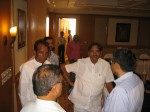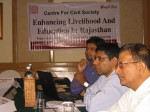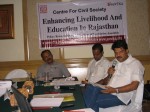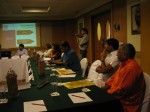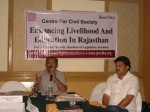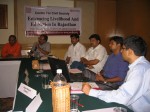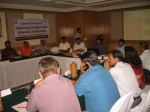CCS organized a Policy Roundtable with Members of Legislative Assembly: Enhancing Livelihood and Education in Rajasthan on National Policy on Urban Street Vendors Policy and Right to Education Act. The discussion was chaired by Dr. Parth J. Shah (Noted economist, writer of several books, columnist and professor at Michigan University, USA. For more information about Dr. Shah, please visit http://parthjshah.in/ ).
Policy Roundtable: Enhancing Livelihood and Education in Rajasthan
21 July 2011, 11 AM – 1 PM, Hotel Park Prime (Park Plaza)
C-59, Prithviraj Road, C-Scheme, Near Statue Circle, Jaipur
Discussing issues of street vendors with MLAs Amit Chandra said, “Street vendors constitute an integral and legitimate part of the urban retail trade and distribution system for daily necessities of the general public. After the landmark judgment by Supreme Court of India in a 1989 case of Sodan Singh & Others versus New Delhi Municipal Council, there have been some steps taken by local authorities but necessity of a national policy/law was always felt to heel the ailing condition of the street vendors. Central government introduced a National Policy on Urban Street vendors 2004 for the first time and once again came up with National Policy on Urban Street Vendors 2009 recognizing the positive role of street vendors in providing essential commodities to people at affordable prices and at convenient places. Government of Indian also drafted a model act in 2009 and asked the state governments to make state legislation following the model act but Rajasthan Government has yet not been able to bring the legislation in the state as yet.”
Policy analyst Dr. Parth J. Shah shared his comments on Right to Education Act with MLAs and said, “With the passing of the Right of Children to Free and Compulsory Education Act (RTE) 2009, the education sector in India stands at the cusp of a great transformation. One year on, RTE still holds the promise of expanding access, improving quality and ensuring equity – but only 15 states have notified their state rules while other states are in the process of finalizing. An analysis of different states rules reveal diverse and innovative ideas that are being explored in different states. Some states have been more inclusive in their process and have worked together with experts from the civil society. An initial analysis of state rules and the process indicates benefits that states could accrue from an exercise that would enable them to share their experience and ideas that have emerged in their individual states.”
Given the current status of the Right to Education and Street Vendor Act in Rajasthan MLAs found the program, one-of-its-kind inIndiawhich was designed to create a platform for open interaction between policy makers and policy analysts. 25 selected MLAs from Jaipur, Ajmer, Kota and other parts of Rajasthan who had demonstrated strong interest in social policy solutions in past and had encouraged frank and open discussions on the problems facing our country participated in the Policy Roundtable. The MLAs went back with a clearer understanding of the issue and suggestions for reforms in these areas from the program. Few MLAs also promised to take the issue forward.
Here are few press clips:
Press Cutting 1 Press Cutting 2
Here is a video clip from BTV News:
Here are few pictures of the program:


